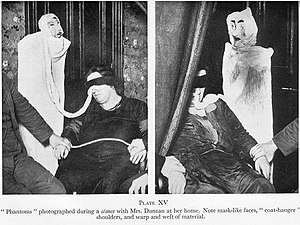Ektoplasma (perdukunan)
Ektoplasma (saka basa Yunani ektos, sing artine "njaba", lan plasma, tegese "soko sing dibentuk utawa dicetak") yaiku istilah sing digunakake ing perdukunan kanggo nuduhake zat utawa energi spiritual "eksteriorisasi" dening medium fisik. Iki digawe ing taun 1894 dening peneliti psikis Charles Richet.[1] Sanajan istilah kasebut nyebar ing budaya populer,[2] eksistensi fisik ektoplasma ora ditrima dening ilmu pengetahuan[3][4][5] lan akeh conto sing dikatutake dibabarake nalika iku namung hoaks ikang digawe saka cheesecloth, gauze utawa bahan kimia liyane.[6][7]

Rujukan
besut- ↑ Blom, Jan Dirk. (2010). A Dictionary of Hallucinations. Springer. p. 168. ISBN 978-1-4419-1222-0
- ↑ Badley, Linda (1995). Film, Horror, and the Body Fantastic. Westport, Connecticut: Greenwood Publishing Group. kc. 45–. ISBN 978-0-313-27523-4.
- ↑ Pulliam, June; Fonseca, Anthony (26 September 2016). Ghosts in Popular Culture and Legend. Santa Barbara, California: ABC-CLIO. kc. 89–. ISBN 978-1-4408-3491-2.
- ↑ "Ectoplasm" Archived 2011-01-11 at the Wayback Machine.. Glossary of Key Words Frequently Used in Parapsychology, Parapsychological Association (2006-01-24).
- ↑ Hines, Terence (2003). Pseudoscience and the Paranormal. Amherst, New York: Prometheus Books. kc. 44–. ISBN 978-1-61592-085-3.
- ↑ Stein, Gordon (1993). Encyclopedia of Hoaxes. Farmington Hills, Michigan: Gale Group. kc. 205. ISBN 0-8103-8414-0.
One strange phenomena of spiritualism, once popular, was the production of ectoplasm. This was a white substance that appeared to ooze from various openings of the medium's body. It was usually made of gauze, chiffon, or cheesecloth, often soaked or treated with various substances.
- ↑ Frazier, Kendrick (2009). Science Under Siege: Defending Science, Exposing Pseudoscience. Amherst, New York: Prometheus Books. kc. 330–. ISBN 978-1-61592-594-0.